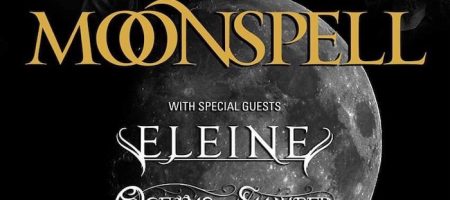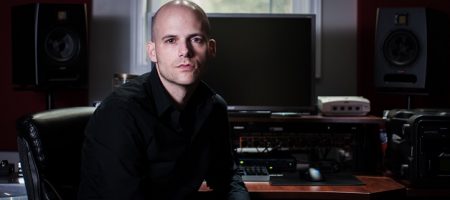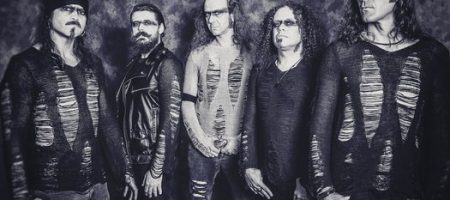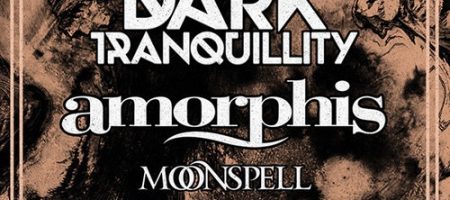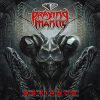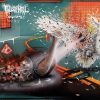Moonspell – Isolation and Loneliness
Thursday, 18th February 2021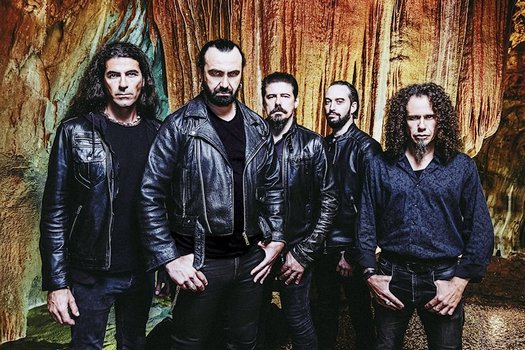
Now approaching 30 years as a band, Portugal’s Moonspell have been an act to watch when it comes to the dark and gothic side of the genre. While the band has continued to grow and evolve, they haven’t been afraid to take risks and dabble in different areas, all while still carrying that heavy, gothic vibe. The band’s latest release, Hermitage [out February 26 on Napalm Records – preorder HERE] is one that seems to really revel in gloom. A bit less heavy, and somewhat more pensive at times, it marks yet another beginning for the band – notably with a new drummer in the act too. Vocalist Fernando Ribeiro chatted with us at length about the new album and drummer, as well as their recent reissues and entering the ‘final chapter’ of Moonspell.
Dead Rhetoric: What do you feel defines Hermitage as your latest album?
Fernando Ribeiro: I think it’s a grown up album. I’m not so sure about the people who liked the younger version will have a ball with it. We kind of did what older people do. We searched for simplicity, we searched for clarity. We really knew what we were doing and what we wanted to do. The choices were dead certain. Even if the album is more loose and fluid, I think it’s our most musically mature, or adult, album. I wanted an album that was reflecting, not only lyrically but musically, the world around us. I feel like it’s a moment of clarity, or a new page that has been turned.
I think it’s healthy to talk about it, but it’s the last chapter definitely. Nowadays, music is more meaningful than ever. We can be accounted for in what we did [laughs], and I think we stripped down all of the layers, all of the gothic arrangements, and just made music. It’s a gamble, but it’s exactly what we wanted to have in this time of our lives, and the time of Moonspell, which is coming up on 30 years in 2022.
Dead Rhetoric: I saw an interview where you mentioned the album had an overarching theme of loneliness. Was it just coincidence that it’s now being released during an isolated time?
Ribeiro: The first time I pointed out the word hermitage in my notebook, which I keep for ideas, was back in 2017. I think back then, we had already reached a certain state in the world. We have a lot of connectivity, but we didn’t have enough true connections. I was born in 1974, and even then, it was a fragmented world. Bad guys and good guys. The world was divided between the two superpowers during the Cold War: the US and Soviet Union. Even though we are always on the brink of a nuclear war, and there were all of these novels and films about it, nothing so radical really happened as much as it has in the last decade. Not counting the two world wars that occurred before of course. Having said that, people in 2017 weren’t fragmented anymore, they were pulverized. It was so hard to talk about even simple things. I’m not just referring to social networking, which is where I think it all started, but it really jumped into our lives. It was hard to speak about politics, sex, identity, and even music, without losing 3-10 friends.
The image I thought of with Hermitage in mind was that you are stonewalling yourself around, making your own bricks or cocooning yourself. I thought it was intriguing, so I read some books about the hermit lifestyle. I had a lot of misconceptions about it. It kind of evolved into something about solitude, but also the way that we could reconnect with humanity. For me, it’s not about going to the desert to fast and pray and be with God, and be tempted by the Devil. That’s more of an orthodox Christianity kind of thing. I think hermitage can be more like a state of mind – taking a break, and then coming back to your community with a new perspective. I think it’s high time that we do that.
The people of the world are taking the rug out from under us. We are all falling down and tumbling, and there’s a certainty that there’s very few happy people in the world if they go and think about it. In a way, yeah, we are alone and we just tried to transport that idea into a more melancholic soundscape. Something more emotional. Sometimes it rocks, but sometimes it doesn’t. We try to put the right measure of things in, and have the right amount of contemplation in mind. When we started writing it in 2017, all of a sudden, we were then ‘boom,’ social distancing by the law. Even if it was coincidental or not, it tells a lot about how we set up our world. We came in so fast and we are so involved getting the next thing or next app, or eating exotic animals – enjoying life without sustaining it. Nowadays, we are really in deep shit [laughs].
Dead Rhetoric: You mentioned the melancholy – how important is the combination of melancholy and heaviness for Moonspell?
Ribeiro: I think that’s the whole dynamic of Moonspell. Every band has their own dynamic, and sometimes it takes a while to get there. One band that comes into my mind is, even though they aren’t a direct influence for Moonspell I have loved them since I was like 16, is Death. I have a lot of the vinyl for Scream Bloody Gore to Individual Thought Patterns and beyond. I always felt that they had an extremely characteristic sound and dynamic. I always looked up to this, because even if you look up the earlier material like the demos, they really nailed it. They created their own formula that wasn’t frozen or attached to a particular style – they evolved into a really progressive style. You put them on and you instantly know it is them.
I think that’s what Moonspell, with its own way, with other influences and not as much of an extreme side of things, has been trying to find out slowly but surely with our music. I think the dynamic between the melancholic and then a heavier part, that dynamic is exactly what we can all a bit of our own. We have been doing it with no strings attached for many albums. Hermitage is more balanced when it comes to that aspect. I think if you really have to do the math, melancholy wins over the heavier parts. But when the heavy parts come in, they sound really cool. It’s a release from this more suffocating atmosphere that melancholy brings. You are in a coffin and you just break through with your hands. Sometimes, I have these impressions – songs like “The Greater Good” where there’s these almost hypnotic loops and the dubbed vocals, but in the end, it’s something more epic.
I really like to listen to music, and in 2020 I listened to more music than ever, and I found even within metal, there is a lot of interesting stuff. Most of that stuff was dynamic. It was fluid. It was not this kind of power metal thing, where everyone is giving it their maximum, and when you get out of the record, you are so tired [laughs]. The drums are fast, the fingering is so extreme – and the girl or boy, it doesn’t matter – they are singing with more heart than what is humanly possible. They hit so many notes. I felt a bit disturbed as a listener, and as a band member, and I can’t compete with that. I have to go around it. I think Hermitage is definitely going around it [laughs].
Dead Rhetoric: It goes along with as you were saying, as you get older you have that look towards something simpler. As you get older, you realize that maybe you don’t have to have X, Y, and Z just blasting the whole way through. It can be something more subtle and relaxed.
Ribeiro: I don’t think I have that enthusiasm either. It’s not that I don’t have anything to prove, I don’t take anything for granted in Moonspell. Especially the way that we treat music, and the way that we present different options to our fans. Sometimes, I have to think about it. When we did Wolfheart and Irreligious, we were sweethearts. It was a brand new band, and it was a bit outrageous with gothic, metal, and folk, and whatnot. A lot of people thought it was shitty. But we hit the right nerve with touring and working hard, like every band does, we were onto something. Then we played different cards. That’s been our dynamic.
I think it’s not a question of wanting it or not, at least as far as Moonspell goes, as you don’t really get to choose. For instance, a meal or if you want your steak well-cooked or medium rare, or you want a vegetarian meal. Obviously, being Portuguese I have to talk about food [laughs], but it’s a different process. Sometimes you just get into the motion, you go with the flow. It happens a lot in Moonspell. We were not smart enough to pick up a formula and repeat it, or we didn’t like the formula enough. So when it comes to being more subtle, it definitely comes more with age, but it also comes with the fact that you are enabled to do that and still be authentic with it. Whenever I see older guys try to be young, I feel uncomfortable. I’m not a young guy anymore. I can’t be the older guy trying to make it with the younger guys. I can listen to them, I can respect them, and I can learn from them. But I can’t be like them. It’s a question of mutual respect even. That’s why our music gets more moody. We get more moody as well – that’s for sure.
Dead Rhetoric: Moonspell doesn’t go through a lot of band members. Was it tough to choose a new drummer in Hugo Ribeiro?
Ribeiro: It was very tough, personally. We would have liked to have it done on friendlier terms. But Mike Gasper, our former drummer, lawyered up and we had to sign a confidentiality agreement so I always have to tread lightly for the explanation for his wish. As a former friend and band member, I can only wish him the best. For the fans who were disappointed with him leaving, I hope that he still has the will and talent to work with other people, and use his experience in Moonspell as a drummer for many years, 28 years to be exact, to bring himself back to the scene. I really wish him the best.
But we came to a point where it was almost deciding between Mike and the band. Obviously, friendships and brotherhoods apart, the band always wins in the end. It’s already a little bit more than the sum of the parts. I lost a drummer, but my heart was especially broken about losing a friend. It really plays with your mind when something that you didn’t see coming happens. I never thought Moonspell would get to the point where we would split ways with Mike. I wasn’t involved in the picking of the new drummer because of those reasons, and I’ve been transparent about that. I left that to Pedro [Paixão]. Not because I didn’t want to have the responsibility, but I needed some time to think about it. We were moving on, we had a new album and some shows that eventually got postponed and cancelled.
On the other hand, I think Pedro did a great job of picking up Hugo, who has the same last name as me, even though we are not relatives. It’s a common name, like Smith or something in the United States. I was curious how Hugo would do, and we were looking for something different. We didn’t really have the chance to consolidate him before recording the album because of COVID and we didn’t get to tour. But I embraced Hugo with an open mind. I think first impressions are really important when you meet someone. I think he had a really spectacular energy about him. I’m not a guy who goes into that sort of thing, but it’s a good way to figure out people and the way they are around you. I don’t know if it’s a karmic thing, because that’s not really my field of view, but I had a good feeling about him.
The moment of truth was when he sat down to play the old songs, like “Wolfshade” or more recent songs like “Night Eternal” – the challenging songs as well, it felt right. It felt like he had studied and he really wanted this to happen. It brought back an incredible energy to those songs. We were lucky enough to play four shows in Portugal, normally we play much more but I think these shows were meaningful as well because we had a new drummer and a chance to introduce him. When he came to record the new album, he was already providing his own style. I think he did an incredible job. Even though we lost a lot with Mike’s split, I think we gained something as well with Hugo as a replacement. Even though it’s not a replacement, it’s a new thing.
We got lucky that we could find a Portuguese guy because we were also considering having a friend abroad helping out. But in Moonspell, we prefer to have someone we can call up and see in a matter of hours and be together in the studio and work as a team. Even if it’s working from home, but when it’s legal and safe to be in the studio. It’s been a while since we have been together, but we are coming together tomorrow to sign many albums – the webshop presales. It’s good on the one side, but I think with Hugo and Ricardo [Amorim] because they play with their hands, they will start bitching half way through [laughs]. But I think there was a lot of things that could have gone wrong, but they went right. So far so good with Hugo!
Dead Rhetoric: There was a biography written for the band’s 20th anniversary. Do you think an update is in order for the 30th?
Ribeiro: I talked about it with Ricardo Amorim [author] – there are also many Ricardo’s here in Portugal. Ricardo and Pedro are very common names. Ricardo got in touch with us because I sent him a lot of confidential information about Moonspell accounts and plans, and he has exactly the same name as our guitarist. A lot of people thought it was our guitarist that wrote the biography, but no, they just have the same name. I know it gets confusing. But I think the biography is getting some foreign editions. We have the English version with Cult Never Dies, we have a Mexican version, and we are now releasing it in Brazil because it’s in Portuguese. It’s like the difference between British English and American English. Brazilian Portuguese is more up to date, and not as traditional. So we had to make a few changes in translating it.
But I think it’s actually a good idea [an update], and I thought that if we were to do it, maybe we should do it now since the band is a bit different. We should at least address it, maybe change the cover, and we will probably end up doing something about it for the foreign editions. The loss of Mike cut down on some of the plans we had for the 30 years, but its just like everything in the past 2 years. It’s about making new plans, and not crying over the wasted ones. If there is something to be learned from this pandemic with all of the rules and regulations, it’s that whenever you plan something, you already are planning that 90% chance that it will change. If bands planned A, B, and C plans, nowadays you go through the whole alphabet [laughs]. Things are not solid at all, but we will definitely upgrade some stuff, and maybe even write a new book with this new formation of Moonspell. I think there’s definitely some subject matter to be written about.
Dead Rhetoric: Given the nature of some of the band’s older releases, has doing all of the recent reissues brought any new interpretations or changes in perspective to them, either from yourselves or fans?
Ribeiro: I think it did. Even the biography book did. It allowed us to see the big picture – as characters in a book, even if it was a biography. A lot of the stuff I didn’t understand it in the same way. I even disagree with some of it [laughs], but I think that’s the way a biography should be! I didn’t write it myself, and I didn’t want to since it would be one-sided. When it comes to the reissues, I think it’s a win-win. The first motivation is that its practical. Every day, we hear that the music industry is dead. The physical format has lost the battle. But for me, physical shows a big, larger than life character that is really important for metal fans and metal music. We are still romantic about it. We like to buy and possess the physical object. On the other hand, this same disposition for people to see digital as not really the future, but the present and only alternative – they say that you can’t sell records, but I said, “Pardon me, we have hundreds of people waiting in line for our out of print, sold out vinyl, cd, and tapes.”
I reached out to Century Media and SPV so that we could get the rights for two albums. We formed our own label, Alma Mater Records, and one of the intentions was to cater to the Moonspell community and the newer fans, who buy records. We rereleased the albums chronologically, and it has been a big success. Not only did it give another life to those records, but it gave another life to different perspectives about them. I was so surprised by The Butterfly Effect’s response. I remember it was such a hated album back then. Nowadays, people ask me if we still have these records for sale. We sold out – we cannot print 20,000 records. We can print 1000, 2000, or 5000 like we did for Wolfheart. We sold them all. Irreligious is going to be reprinted for its 25th anniversary in May of this year. I think it’s great – it helps the band, it helps the fans, and it brings back the music from not existing to the record players. People are on social networking bragging about vinyl, which is beautiful – contrary to bragging about other stuff. I think we will keep doing just that.
We are taking it a notch down right now because we want to focus on the new album, since we have some spectacular editions. Napalm did an amazing job. But next up will be the Irreligious 25 anniversary, and we are going to release the rest of the stuff from the Century Media catalog. Namely, Darkness and Hope and The Antidote. Then we have to find a way to reach through Napalm, because 1755 is sold out on vinyl. Alpha Noir and Omega White are sold out in vinyl, and we have a lot of requests. I think it’s a wasted opportunity if you don’t cater to this. It shows that a band is alive, and that we have a legacy. Even if we might think it’s strange for guys from Portugal to have a legacy, people keep buying our vinyls and tapes – it’s selling.
Dead Rhetoric: I bring this up only because of the way you phrased this at the beginning of the interview and I’ve seen some things on promo sheets – you mentioned this being the final chapter of the band. Hypothetically speaking, when will you know when the time is right for Moonspell to end?
Ribeiro: I think it is healthy to think about the end. Bands are temporary. We are not a classic band, we are not an established band. We are a struggling band. It might even happen against our own will and wishful thinking. If we don’t find ourselves inspired, or if we want to do something else, or if we/our fans have had enough. I think it’s healthy to think about the band as a more temporary thing, even though it’s already ¾ of my life already, than to be stuck in a kind of immortality trip. Being all about the band and how to maintain it. I think that’s very dangerous for musicians. Music is beautiful, but it’s not a bed of roses.
For Moonspell, we don’t take anything for granted. That’s why we say that we are a struggling band. It’s not a definition, it’s something I live through every day. It’s like we aren’t loved, but we are hated as well. We are hated with as much passion as we are loved. Nowadays, you can’t sweep the hate under the rug. It will come to you, especially via social networks. You can run, but you can’t escape it. That grinds you down, and people without that no strings attached attitude that allows them to realize that we are not Judas Priest or Metallica, or even Amon Amarth, who have gained a large reputation – or Sabaton or Nightwish. We are Moonspell, and we are struggling for room in a competitive scene. Sometimes, we think our time will come. That allows us to be free. We aren’t rich and I have the ‘fuck you’ cash and give up tomorrow, no, I will have to find another job – music related or not, I don’t know what the future holds even at 46. That’s a scary thought! But it’s the thought I have. But when you are too attached and try to repeat the really big and established bands, you sometimes end up killing yourself, which has happened, or you start to live a more destructive lifestyle, because you can’t find meaning in anything at all than just your band.
Don’t get me wrong, the band defines me very well, but so do other things. I think that is a learning process. I think that in 2022 we will see 30 years of Moonspell, but its impossible to go around for 30 more years. I will be 50 in four years. I don’t want to be 60 years old on stage. I won’t feel authentic – making a buck singing “Vampiria” in a small club, maybe even a smaller club than we sing in right now. I don’t see that happening. I understand and respect people who have the call. Our bass player wants to die on stage. But I don’t think he will die on stage with Moonspell. That much I can tell you. I think it’s very important to know when to leave. The future is quite unpredictable, and things can happen in a different way, but that’s how I feel right now. We are in the last chapter, and the end has to be one of the best parts of the book. So I think we will write interesting music with this in mind.
Dead Rhetoric: It seems like that would give you that extra hunger, so that you always put out something that is the best, since it might be the last – that sort of mentality.
Ribeiro: Same for the shows, when they happen. If you take things for granted, and get into a routine. You get good shows, but authentic shows are better. Nowadays, with the pandemic, you don’t know when you are going to get out on the road. I’m content that we gave our best in the last tours we did, since we already had that mentality.
Dead Rhetoric: What’s happening for this year with the band?
Ribeiro: We have a lot of plans, and we don’t want to fall off of the radar, but when people ask if something is going to happen, we can’t answer if it will. But it’s better to be there, and have something to look forward to than have nothing. Everyone thought that one year would be enough to clear the virus so that people can enjoy life again. For some people, enjoying life is going to festivals and shows. But we aren’t really there, are we? We take it day by day. We are focused on what we can do remotely. We have a fan club on Patreon, and we are doing content to spread on social networks and YouTube. We did a stream last year and it was quite successful. We had a live crowd, and a crowd watching from abroad, so we are thinking to repeat that as well.
We are really trying our best, but I cannot say that we are going to be tour. We have a lot of festivals booked but no one knows if they are going to happen. The plan is not to make plans [laughs]. We are trying to do something that we can control more, and tours are hard to control in good times, let alone all of this fear and sanitary preparations. I don’t think 2021 will be such a great year for live music. We do hope that in the second half of the year we can start playing Hermitage live, but I think our compass is more set for 2022, where things will probably be a bit better. No one knows. It’s all speculation. Some people think it’ll be like a post-war feeling where we life to the fullest, but maybe we are afraid and we cherry pick gigs because we are broke and didn’t have a proper job during the pandemic.
We will update our fans by the usual means, but what is on our table now is a show on the first of May in Portugal that was postponed from February, a couple of festivals, and then trying to make a tour that combines Hermitage and 30 years of Moonspell in 2022. If there are streaming concerts, it will not be before April, because Portugal is under heavy lockdown and I think it’ll go until the end of March. We have to be patient, that’s the main plan.











